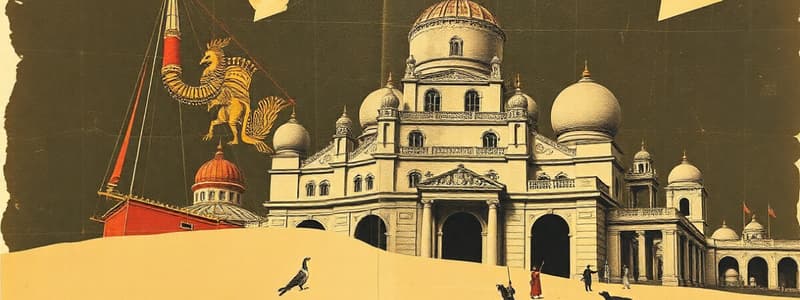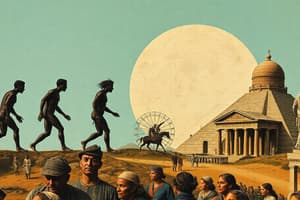Podcast
Questions and Answers
What is a defining characteristic of ancient civilizations?
What is a defining characteristic of ancient civilizations?
- Nomadic lifestyles
- Isolation from other societies
- Lack of social stratification
- Urban development (correct)
Which civilization is known for the Code of Hammurabi?
Which civilization is known for the Code of Hammurabi?
- Mesopotamia (correct)
- Egypt
- Indus Valley
- China
What significant change occurred during the Neolithic phase of the Stone Age?
What significant change occurred during the Neolithic phase of the Stone Age?
- Shift to agriculture and permanent settlements (correct)
- Development of writing systems
- Use of bronze tools
- Increased hunting and gathering
In which era did iron metallurgy become widespread?
In which era did iron metallurgy become widespread?
Which early human ancestor was known for their tool-making abilities?
Which early human ancestor was known for their tool-making abilities?
What was a key feature of Mesolithic societies?
What was a key feature of Mesolithic societies?
Which stage of human evolution is characterized by bipedalism but small brain size?
Which stage of human evolution is characterized by bipedalism but small brain size?
What cultural achievement is associated with ancient Egypt?
What cultural achievement is associated with ancient Egypt?
Flashcards are hidden until you start studying
Study Notes
Cultural History
- Definition: The study of cultures, their development, and the influences across different societies.
- Key Aspects:
- Art, music, literature, and traditions that shape human experiences.
- Interactions between different cultures through trade, migration, and conquest.
- The impact of social structures, politics, and economics on cultural practices.
Ancient Civilizations
- Definition: Complex societies characterized by urban development, social stratification, and cultural achievements.
- Examples:
- Mesopotamia: Birthplace of writing (cuneiform) and early advancements in law and governance (Code of Hammurabi).
- Egypt: Notable for its pyramids, hieroglyphics, and polytheistic religion.
- Indus Valley: Known for advanced urban planning and drainage systems.
- China: Early dynasties (Shang and Zhou) established significant cultural practices, including Confucianism.
- Mesoamerica: Civilizations like the Maya and Aztec with developments in agriculture, astronomy, and complex calendars.
Stone Age
- Time Period: Prehistoric period characterized by the use of stone tools.
- Phases:
- Paleolithic:
- Hunter-gatherer societies, development of language, and use of fire.
- Art (cave paintings, carvings) indicates cultural expressions.
- Mesolithic:
- Transition phase with advancements in tool technology and semi-nomadic lifestyles.
- Neolithic:
- Agricultural revolution - shift to farming and permanent settlements.
- Development of more complex social structures and pottery.
- Paleolithic:
Iron Age
- Time Period: Follows the Bronze Age, characterized by the widespread use of iron tools and weapons.
- Key Features:
- Introduction of iron metallurgy, leading to stronger tools and agricultural advancements.
- Rise of complex societies and early states due to increased agricultural productivity.
- Notable cultures: Celts in Europe, early African kingdoms, and the emergence of empires in Asia.
Evolution of Man
- Key Concepts:
- Humans belong to the species Homo sapiens, which evolved approximately 300,000 years ago.
- Major stages of human evolution:
- Australopithecus: Early hominins, bipedal with small brains.
- Homo habilis: Known for tool-making abilities.
- Homo erectus: First to use fire and migrate out of Africa.
- Neanderthals: Coexisted with early modern humans; used sophisticated tools.
- Homo sapiens: Advanced cognitive abilities, language, and cultural expression.
Origins and Movements of the Bantu-Speaking Peoples
- Origins:
- Bantu-speaking peoples originated from West/Central Africa around 3000 BCE.
- Migration:
- The Bantu Expansion (1000 BCE - 500 CE): migration south and east across Africa.
- Spread of languages, agriculture (yams, bananas), and ironworking technology.
- Cultural Impact:
- Formation of various ethnic groups and kingdoms (e.g., Zulu, Kikuyu).
- Significant influence on local cultures, languages, and social structures across Eastern and Southern Africa.
Cultural History
- Examines cultures, their development, and influences across different societies.
- Explores how art, music, literature, and traditions shape human experience.
- Analyzes interactions between cultures through trade, migration, and conquest.
- Investigates the impact of social structures, politics, and economics on cultural practices.
Ancient Civilizations
- Complex societies with urban development, social stratification, and cultural achievements.
- Examples:
- Mesopotamia: Developed cuneiform (writing), established early laws and governance with the Code of Hammurabi.
- Egypt: Known for pyramids, hieroglyphics, and polytheistic religion.
- Indus Valley: Advanced civilization with urban planning and drainage systems.
- China: Early dynasties (Shang and Zhou) established cultural practices like Confucianism.
- Mesoamerica: Civilizations like Maya and Aztec with advancements in agriculture, astronomy, and complex calendars.
Stone Age
- Prehistoric period characterized by the use of stone tools.
- Divided into three phases:
- Paleolithic:
- Hunter-gatherer societies, development of language, and use of fire.
- Art forms (cave paintings, carvings) reflect cultural expressions.
- Mesolithic:
- Transition phase with advancements in tool technology and semi-nomadic lifestyles.
- Neolithic:
- Agricultural revolution - shift to farming and permanent settlements.
- Development of complex social structures and pottery.
- Paleolithic:
Iron Age
- Era following the Bronze Age, marked by the widespread use of iron tools and weapons.
- Key features:
- Introduction of iron metallurgy, leading to stronger tools and agricultural advancements.
- Rise of complex societies and early states due to increased agricultural productivity.
- Notable cultures: Celts in Europe, early African kingdoms, and empires in Asia.
Evolution of Man
- Humans belong to the species Homo sapiens, which evolved approximately 300,000 years ago.
- Major stages of human evolution:
- Australopithecus: Early hominins, bipedal with small brains.
- Homo habilis: Known for tool-making abilities.
- Homo erectus: First to use fire and migrate out of Africa.
- Neanderthals: Coexisted with early modern humans; used sophisticated tools.
- Homo sapiens: Advanced cognitive abilities, language, and cultural expression.
Origins and Movements of the Bantu-Speaking Peoples
- Originated from West/Central Africa around 3000 BCE.
- Migration:
- The Bantu Expansion (1000 BCE - 500 CE): migration south and east across Africa.
- Spread of languages, agriculture (yams, bananas), and ironworking technology.
- Cultural Impact:
- Formation of numerous ethnic groups and kingdoms (e.g., Zulu, Kikuyu).
- Significant influence on local cultures, languages, and social structures in Eastern and Southern Africa.
Studying That Suits You
Use AI to generate personalized quizzes and flashcards to suit your learning preferences.




